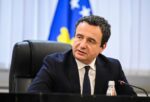On April 3, NATO foreign ministers will begin a two-day meeting in Brussels to discuss strengthening the alliance’s defense capabilities. The meeting comes as European nations face increasing pressure from the United States to boost defense spending.
NATO Secretary-General Mark Rutte emphasized the significance of the meeting, calling it “a particularly critical moment for our shared security, with immense challenges that we must address together.”
U.S. Commitment to NATO Under Scrutiny
Despite concerns that President Donald Trump is undermining transatlantic relations, Rutte insisted that the U.S. remains committed to the alliance.
“I know there has been tough rhetoric. I know some allies on this side of the Atlantic are worried about the long-term U.S. commitment to NATO,” Rutte stated. “However, the Americans have consistently reaffirmed: ‘We are committed to NATO. We are committed to Article 5.'”
Rutte expressed confidence that the alliance will continue to thrive with U.S. participation, reinforcing the importance of collective defense.
Divisions Over Ukraine and Ceasefire Negotiations
NATO allies are determined to present a united front against Russia’s full-scale invasion of Ukraine. However, European allies feel increasingly sidelined in ceasefire negotiations, with Washington reportedly suggesting that Ukraine may need to make territorial concessions. The U.S. has also taken steps to restart dialogue with Russia.
U.S. Secretary of State Marco Rubio will attend the meeting alongside Ukrainian Foreign Minister Andriy Sybiha and EU foreign policy chief Kaja Kallas. Rubio is expected to face tough questions from allies, many of whom are alarmed by the Trump administration’s efforts to improve relations with Russia and its verbal attacks on long-standing transatlantic partners.
Concerns among European officials have grown since Trump took office in January, particularly regarding the future role of the U.S. in NATO. Rubio is also likely to face pressure over Trump’s controversial proposals, including his expressed desire to make Canada the 51st U.S. state and his previous attempt to annex Greenland, an autonomous Danish territory and NATO ally.
Pressure to Increase Defense Spending
Rubio arrived in Brussels on April 3, accompanied by newly confirmed U.S. Ambassador to NATO, Matt Whitaker. They are expected to push for European allies to increase defense spending and share more of the financial burden.
NATO leaders are set to decide in June whether to raise the minimum defense spending target from the current 2% of GDP per member state. The Trump administration has proposed increasing this threshold to 5%, while Rutte has advocated for a swift commitment of at least 3.7% with regular progress reports.
However, some European allies are hesitant to commit to significant defense spending increases due to slow economic growth and rising budget deficits.
Ukraine’s NATO Prospects and Military Support
Sybiha is expected to brief NATO counterparts on the latest battlefield developments. While Ukraine’s NATO membership is not on the agenda, most European allies are focused on ensuring continued U.S. arms shipments to Kyiv and maintaining NATO’s military training mission for Ukrainian forces.
So far, no major changes have been made regarding U.S. troop positions on NATO’s eastern flank. However, a key shift has occurred: the U.S. no longer leads the Ukraine Defense Contact Group, known as the Ramstein Group, which coordinates military support for Kyiv. The U.K. chaired the group’s last meeting in February, and the next meeting, scheduled for April 11, may be co-led by the U.K. and France.







